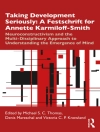What do we know about identity processes and how does this relate to the world we live in?
This book answers this question by considering the contemporary major developments in identity process theory – a framework founded by the author in the 1980s for understanding the coping strategies used when identity is threatened. With a focus on issues ranging from group conflict to dementia and mental illness, as well as contemporary events and phenomena such as the rise of the Digital Era and the COVID-19 pandemic, Identity explores how building and defending a unique identity motivates our thoughts, feelings, and actions. Breakwell brings together ideas of personal identity and social identity to show us how they intersect with one another.
This book is essential reading for psychology students and researchers, and those interested in the concept of identity in the social sciences more broadly.
Dame Glynis M. Breakwell is Professor Emeritus at the University of Bath and has Visiting Professorships at Imperial College, London and University of Surrey.
विषयसूची
Chapter 1: Identity, Unique and Shared
Chapter 2: Identity Composition and Expression
Chapter 3: Identity Resilience
Chapter 4: Identity and Social Support
Chapter 5: The Assessment of Threat to Identity
Chapter 6: Identity in Public Crises and When Under Attack
Chapter 7: Identity and Group Dynamics
Chapter 8: Identity Process Limits
Chapter 9: Using Identity Theories
Chapter 10: Adaptation and Evolution
लेखक के बारे में
Dame Glynis M. Breakwell is Professor Emeritus at the University of Bath in the Department of Psychology and has Visiting Professorships at Imperial College, London and the University of Surrey. Her research focuses upon identity process theory, social influence and social representation processes, leadership in complex organisations, and the psychology of risk management, perception, and communication. She has published more than 20 books, several of which are on research methods. She has been an adviser to both public and private sector organisations on the use of psychological methods and theories, especially concerning responses to public crises and major emergencies.












